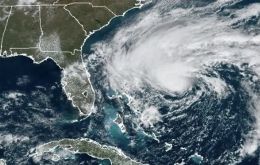MercoPress. South Atlantic News Agency
Environment
-
Monday, November 14th 2022 - 10:08 UTC
Shipping industry addresses decarbonization goals: training of 800,000 seafarers required

A new action plan, launched at the COP27 climate conference in Egypt by United Nations organizations, ship-owners and unions, sets out recommendations to up skill seafarers to meet shipping’s decarbonization goals.
-
Friday, November 11th 2022 - 20:16 UTC
COP27 told Brazil in a hurry to start producing green hydrogen

Brazilian dignitaries to the Conference of Parties 27 Climate Summit at the Egyptian Red Sea por of Sharm El-Sheikh announced that their country was in a hurry to start producing green hydrogen and electricity from wind turbines to be installed offshore.
-
Friday, November 11th 2022 - 10:41 UTC
Three killed as Hurricane Nicole makes landfall in Florida

Hurricane Nicole made landfall in the US State of Florida, killing at least three people on Thursday, as the tropical storm evolved into something deadlier, it was reported.
-
Friday, November 11th 2022 - 10:20 UTC
Falklands residents demand “local and world leaders tackle climate change”

In the light and spirit of COP27 a group of Falklands residents have organized a demonstration to “demand action from leaders, both locally and worldwide to tackle the natural disasters we currently face,” organizer Mark McLeod told Penguin News. The demonstration will take place at the Jetty Centre at midday on Saturday November 12.
-
Friday, November 11th 2022 - 10:07 UTC
New satellite monitoring of whales in South Atlantic underway

The 7th edition of the whale satellite monitoring program by the Argentine branch of the Wildlife Conservation Society started the monitoring of 22 specimens in the Atlantic Ocean to obtain data on the life cycle of the southern right whale species, it was reported.
-
Thursday, November 10th 2022 - 09:38 UTC
Germany, Norway and UK support plan to contain deforestation in the Colombian Amazon

Germany, Norway and the United Kingdom are supporting a plan from the Colombian government, working with local communities to contain deforestation in the Colombian Amazon, it was announced at the COP27 taking place at Sharm el-Sheikh, Egypt.
-
Wednesday, November 9th 2022 - 10:40 UTC
Falkland Islander addresses the House of Commons from the dispatch

A Law student at Stoke-on-Trent became the first Falkland Islander to address his “peers” at the House of Commons last Friday during a special session of the United Kingdom's Youth Parliament, with Sir Lindsay Hoyle presiding the meeting.
-
Wednesday, November 9th 2022 - 10:11 UTC
Nicole expected to become a hurricane and make landfall in Florida

As Tropical Storm Nicole threatens to make landfall shortly, NASA's plans to send a rocket to the moon under the Artemis 1 program might be thwarted, according to weather reports from the US State of Florida.
-
Tuesday, November 8th 2022 - 20:38 UTC
AOSIS countries want oil companies to fund climate action through taxation

Antigua and Barbuda's Prime Minister Gaston Browne Tuesday launched an appeal on behalf of the Alliance of Small Island States (AOSIS) for oil companies to pay a “global carbon tax” and thus help undo some of the damage caused climate-change-wise.
-
Tuesday, November 8th 2022 - 09:34 UTC
Pesticides and heavy metals detected in Argentine river waters

According to a report from the National Institute of Agropecuarian Technology (INTA) and the national universities of San Martín (Unsam) and of the Litoral (UNL), a high number of biocides was detected in the Salado River basin in the province of Santa Fe.
